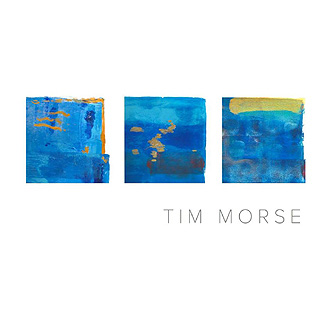 Renowned
among progressive rock fans for Yes Stories, his acclaimed
1996 book about music legends YES, author and singer-songwriter Tim
Morse gets back to his music roots with the 2018 CD release of
III. The Northern California based composer has
long been on the prog music scene and in 2015 he released the self-titled
album by his band The Mangoes. That CD featured a number of other
musicians including Mangoes' Bret Bingham, who also appear
here on several tracks. Morse cites his work with the Mangoes as well
other music influences like the band Field Music and the late great
rock artist Kevin Gilbert. Speaking about the creation of III,
Tim adds, “The
challenge of playing all the instruments appealed to me, especially
having to perform the drums. I’m not a drummer and so I had to
do some wood-shedding to get it down. But I discovered in the demo
process that I missed the input of others, so I decided to bring in
some of my favorite musicians for cameo appearances. I did want to
get to the emotional core of the songs, where the lyric and melody
were very clear."
With Tim’s keyboards and guitars receiving solid backing from
a number of players including Bret Bingham, the songs themselves,
and splendid keyboard-based arrangements are the real stars of the
album. Perhaps the credits tell part of the story as well, with Tim
mentioning his biggest influences including the late great rock legends
Chris Squire and Keith Emerson along with the many fine musos who
back him up throughout the seven track, 46 minute album. Progressive
rock fans who enjoy catchy pop melodies and complex, uptempo arrangements
will find much to like about Tim Morse III. www.timmorse.com
Renowned
among progressive rock fans for Yes Stories, his acclaimed
1996 book about music legends YES, author and singer-songwriter Tim
Morse gets back to his music roots with the 2018 CD release of
III. The Northern California based composer has
long been on the prog music scene and in 2015 he released the self-titled
album by his band The Mangoes. That CD featured a number of other
musicians including Mangoes' Bret Bingham, who also appear
here on several tracks. Morse cites his work with the Mangoes as well
other music influences like the band Field Music and the late great
rock artist Kevin Gilbert. Speaking about the creation of III,
Tim adds, “The
challenge of playing all the instruments appealed to me, especially
having to perform the drums. I’m not a drummer and so I had to
do some wood-shedding to get it down. But I discovered in the demo
process that I missed the input of others, so I decided to bring in
some of my favorite musicians for cameo appearances. I did want to
get to the emotional core of the songs, where the lyric and melody
were very clear."
With Tim’s keyboards and guitars receiving solid backing from
a number of players including Bret Bingham, the songs themselves,
and splendid keyboard-based arrangements are the real stars of the
album. Perhaps the credits tell part of the story as well, with Tim
mentioning his biggest influences including the late great rock legends
Chris Squire and Keith Emerson along with the many fine musos who
back him up throughout the seven track, 46 minute album. Progressive
rock fans who enjoy catchy pop melodies and complex, uptempo arrangements
will find much to like about Tim Morse III. www.timmorse.com
mwe3.com presents an interview with
TIM MORSE
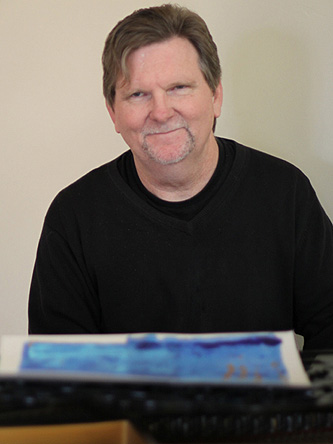 mwe3:
It’s a been a while since we spoke back in 2015 when the Mangoes
put out their first album. But we go back to the 1990s when you released
your book on YES. What else is new in your life in 2018?
mwe3:
It’s a been a while since we spoke back in 2015 when the Mangoes
put out their first album. But we go back to the 1990s when you released
your book on YES. What else is new in your life in 2018?
Tim Morse: Honestly, 2018 was a difficult year as my
mother was terminally ill and she passed away at the end of June.
Finishing the album in the pockets of time I had here and there was
a welcome distraction from the intense emotional roller coaster that
was my life during that period. There were certainly some bright spots
as well, including a healing trip to Alaska and the eventual release
of my album in October.
mwe3: Tell us how you got to three as in the title of the III
album. Seems like a year of threes. I still like your cool album with
The Mangoes and now III. What made you want to play all the
instruments yourself and also you talked about getting to the “emotional
core” of the songs on the album.
Tim Morse: I chose III as the title simply because it
is my third solo album. I was originally going to title it after one
the songs, but I decided I wanted something that wasn’t going
to be misinterpreted... the title of my last album Faithscience
caused a little controversy for some people. The challenge of playing
all the instruments appealed to me, especially having to perform the
drums. I’m not a drummer and so I had to do some wood-shedding
to get it down. But I discovered in the demo process that I missed
the input of others, so I decided to bring in some of my favorite
musicians for cameo appearances.
I did want to get to the emotional core of the songs, where the lyric
and melody were very clear. I didn’t want the message of the
song obscured by busy instrumental passages or obtuse lyrics, so I
looked to cut out anything that seemed extraneous. Don’t get
me wrong—this is still a progressive rock album! But a friend
just told me how much he and his wife were moved by listening to the
new album and I thought that I’d done my job.
mwe3: Is the album opener “Wake Up” a kind of raga
rock progression? You write and sing about a journey to India. The
chorus is kind of Chris Squire inspired and I know you’re a YES
maven from way back then, so would you say the song is Squire-esque?
I think Chris would have liked your III album and did you have some
chances to speak with Chris and Jon?
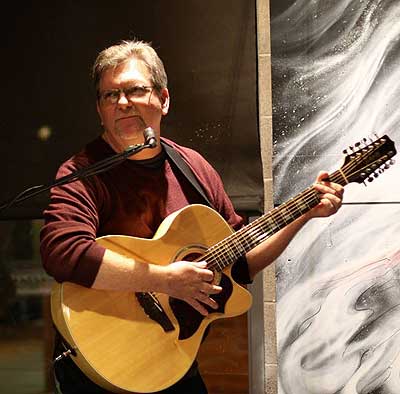 Tim Morse:
I didn’t consider it to be ‘raga rock’, but I like
that term! The song was inspired by Shakti Gawain’s book Return
To The Garden. In it there’s a chapter about her trip through
Europe to India—it’s
really a spiritual journey. As I was writing the song I thought it
did have a YES flavor to it—yes perhaps Squire-esque is the way
to put it, and decided that the bass part could be a homage to Chris
as he had recently passed away. So I contacted Jay Leek who did a
wonderful job in honoring Chris’s memory with his bass performance.
Tim Morse:
I didn’t consider it to be ‘raga rock’, but I like
that term! The song was inspired by Shakti Gawain’s book Return
To The Garden. In it there’s a chapter about her trip through
Europe to India—it’s
really a spiritual journey. As I was writing the song I thought it
did have a YES flavor to it—yes perhaps Squire-esque is the way
to put it, and decided that the bass part could be a homage to Chris
as he had recently passed away. So I contacted Jay Leek who did a
wonderful job in honoring Chris’s memory with his bass performance.
Of all of the members of the classic YES lineup, I knew Chris the
least well. I interviewed him a couple of times and got to hang with
him backstage a bit. I know Jon much better and was an internet collaborator
with him on some music, but that’s a whole other story!
mwe3: “Labyrinth” is a co-write between you and Bret
of the Mangoes. How did you write the track with Bret and how would
you compare it to the writing on the Mangoes album? What synths are
you playing on “Labyrinth” and do you think there’s
a Brian Wilson influence on this track? The track is quite long and
you have some great guitarists on the album and Mark Dean cuts a fine
solo on this track. How did you meet up with Mark?
Tim Morse: With “Labyrinth” I had written the music
and was a little stuck on the lyrics. Sometimes I can get hung up
on the lyric as there can be many ways to approach a subject. So I
contacted Bret and we had a couple of lyric writing sessions and finished
the song. Bret is great, because he gets it and is quick to contribute
ideas. They may or may not be the finished product, but it gives me
the direction to complete the song. The writing on the Mangoes album
was done many different ways between the two of us and so it’s
hard to compare the two experiences.
The synths I use to solo on “Labyrinth” are the ‘soft’
synths included in the Cubase bundle. I’ve rarely used software
synths in the past, but it seemed like a good time to explore recording
with them. I should mention there is a ton of vintage keyboard gear
featured on the album—Hammond
organ, Fender Rhodes, Mini-Moog, ARP and Yamaha synthesizers. There’s
no conscious Brian Wilson influence, but I see what you’re getting
at and it is a great compliment!
I met Mark Dean through Mike Varney of Magna Carta records. Mike had
heard me play and thought that Mark and I would be a good team. I’m
very grateful, because it was the beginning of my professional recording
career. I can’t imagine anyone else doing the guitar solo in
“Labyrinth” anywhere near what Mark played, his performance
was a wonderful gift.
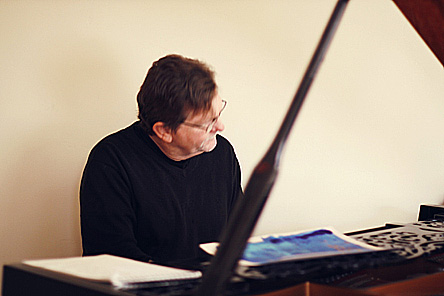 mwe3:
“The Marquis” is one of my favorite tracks on III.
Who is the marquis in your eyes? Would you say there’s an early
1980s McCartney influence on “The Marquis”? Did you play
all the tracks on that song and the guitars too? Can you tell us about
the guitars you play on the new CD?
mwe3:
“The Marquis” is one of my favorite tracks on III.
Who is the marquis in your eyes? Would you say there’s an early
1980s McCartney influence on “The Marquis”? Did you play
all the tracks on that song and the guitars too? Can you tell us about
the guitars you play on the new CD?
Tim Morse: I’m glad you liked “The Marquis”—it’s
definitely one of my personal favorites on the album. The Marquis
is the nickname I’ve given my inner critic, although the song
is really for all of our inner critics. I’d wanted to do a song
about that subject for quite awhile, but needed the right way into
it. Once I decided to approach it tongue in cheek, the song seemed
to write itself. Yes, there probably is a bit of a McCartney influence
on that song, along with others like Freddie Mercury and Elton John.
I did indeed play everything on “The Marquis.”
The guitars I used on the album were:
1. Yamaha F325 (6 string acoustic)
2. A late 1970’s Sigma acoustic (6 string). This is my primary
guitar.
3. Yamaha CG-111C nylon string classical - barely used on the album,
I think it only appears on "The Path"
4. A 1990’s era Fender Stratocaster
5. Takamine G series 12 string
mwe3: How did you co-write “The Path” with B. Warner
and who is B. Warner? That’s another nine plus minute track.
There’s a kind of Jon Anderson influence on this song. Is “The
Path” a kind of meditation and its various attempts to block
out negative thoughts and patterns? Are you into some form of meditation?
And tell us about working with Kurt and Dave on that track.
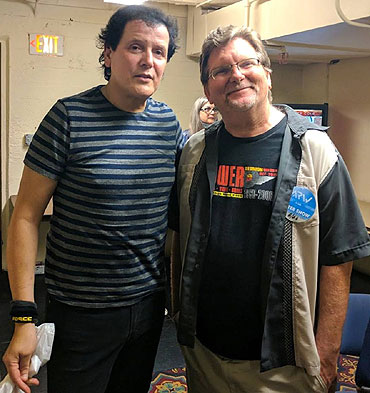 Tim Morse:
“The Path” was originally a guitar suite that came to me
very organically. I was very pleased with the music, but it ended
up being the last song recorded and I was getting somewhat creatively
exhausted. I had written all the music and the lyrics for the middle
section, but I needed to finish the lyrics for the beginning and the
end. For the first time I decided to explore using a professional
songwriter, someone I’d never met, but works for hire, to complete
the song. I found B. Warner through a service and liked her samples,
she seemed like the right fit and we got on like a house on fire.
I really love her line at the end of the song about how ‘Our
spirits are threads in the fabric of time’ - that sums it
up very nicely.
Tim Morse:
“The Path” was originally a guitar suite that came to me
very organically. I was very pleased with the music, but it ended
up being the last song recorded and I was getting somewhat creatively
exhausted. I had written all the music and the lyrics for the middle
section, but I needed to finish the lyrics for the beginning and the
end. For the first time I decided to explore using a professional
songwriter, someone I’d never met, but works for hire, to complete
the song. I found B. Warner through a service and liked her samples,
she seemed like the right fit and we got on like a house on fire.
I really love her line at the end of the song about how ‘Our
spirits are threads in the fabric of time’ - that sums it
up very nicely.
“The Path” is a personal song, about my own spiritual journey.
Meditation is a part of it, although I don’t have a regular practice.
I wouldn’t say it’s about blocking negative thoughts, but
releasing them and staying grounded in your true self.
I was in a band in college with Dave Haddad and Kurt Shiflet. I had
already decided that Kurt would play the epic ending guitar solo,
but I didn’t have a drummer lined up to record the song. Then
it occurred to me that we could have a mini-band reunion through this
recording. I know Kurt just came in, got a level and blew through
those changes on the first take! Dave recorded in his studio, did
a great first pass—I gave him a few notes and then the next day
delivered his performance. It was a blessing working with such talented
musicians!
mwe3: “The Mary Celeste” is about the famous "ghost
ship"? Are you fascinated by those kinds of random disasters...
or are they random at all? Who is playing drums on this track? Jerry
Jennings is also playing guitar on this track. Jerry is a kind of
guitar hero and he goes way back. I have his CDs and he’s also
done a lot of guitar tutorials. Did you write the guitar solo or did
Jerry? There’s also a kind of soaring YES like counterpoint and
some Squire / Bruford / Wakeman style prog passages on that track.
Tim Morse: “The Mary Celeste” is actually about loss
and how sudden loss can be the most difficult to process. It’s
about other things as well, but I don’t want to spell everything
out for the listener. I remembered the story of the Mary Celeste and
thought it could work as a metaphor for loss. I believe that we are
all fascinated by these unsolved mysteries and even today people are
still trying to figure out what happened to the crew of the Mary Celeste.
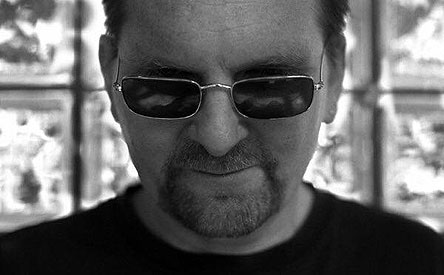 Andrew
Glasmacher played the drums on this song and in fact he did most of
the drums on the album. He is one of my favorite drummers, however
he lives in Utah, so I took some time and went to his studio to track
drums with him.
Andrew
Glasmacher played the drums on this song and in fact he did most of
the drums on the album. He is one of my favorite drummers, however
he lives in Utah, so I took some time and went to his studio to track
drums with him.
Jerry Jennings is a guitar hero! I was in his band and it was a pleasure
to watch him play onstage regularly. I went to his studio and Jerry
ripped off a few solos, it’s probably the second or third take.
I didn’t have any notes for him other than how to end the solo
as it leads directly into the Hammond organ section. The counterpoint
section you mentioned reminds me a bit of Kansas, I think of it as
acknowledgment of the influence Kerry Livgren’s writing had on
me.
mwe3: Who is “My Ally” about? Sounds like a Todd
Rundgren inspired track from the early years. Do you like writing
about childhood experiences from the past? As we get older I guess
we more clearly remember our past. Bret Binghams’ guitar solo
on “My Ally” is excellent.
Tim Morse: “My Ally” is a true story. It is about
meeting my best friend in fifth grade and how our relationship grew
over time. I think it’s the best lyric on the album. I haven’t
written much about my childhood, but it was an enjoyable experience
recounting and writing this particular song. Normally, I’m not
one who dwells in the past. I try to stay in the present moment and
look to the future. However, the past can possibly impact and shape
the future, if only to say, ‘I’m never doing that again!’
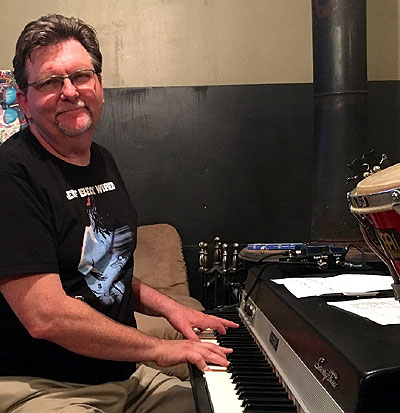 mwe3:
“The Circle / Talisman” closes out the CD. That track is
another co-write between you and Bret. Again, there’s a kind
of Brian Wilson inspired melody on that track. What is the significance
behind this title and putting talisman in the title? What does the
talisman and circle signify? There’s a cool rocking midsection
that kind of juxtaposes a different kind of sound. So it’s a
two-part track?
mwe3:
“The Circle / Talisman” closes out the CD. That track is
another co-write between you and Bret. Again, there’s a kind
of Brian Wilson inspired melody on that track. What is the significance
behind this title and putting talisman in the title? What does the
talisman and circle signify? There’s a cool rocking midsection
that kind of juxtaposes a different kind of sound. So it’s a
two-part track?
Tim Morse: Thank you for comparing my work to so many masters
of melody... Brian Wilson, Todd Rundgren, Paul McCartney. I’m
very flattered to be mentioned in the same breath. “Circle”
is simply an intro I had that was patiently waiting for a song. Around
the time it was finished recording it I heard about the passing of
two old friends and so I dedicated the music to them. So in a way,
your spiritual path/life could be a never ending circle, if you like.
“Talisman” is a song about longing and intention, it is
about wanting to meet your soul mate. The idea is that if you create
the intention that eventually the stars will align and you will meet
that person you seek. That is why the music is so intense in the middle
section. When it happens, it is that intense and passionate—it
does feel like some kind of magic.
mwe3: So now with III out and getting positive acclaim,
what projects are you looking forward to in 2019? 2019 on the horizon…
Tim Morse: There will be a limited edition vinyl version of
the album that will be available in January. I am very excited about
this, I just received the test mastering and it sounds incredible
on vinyl! Also, at the same time there will be a bonus disc of demos,
live performances, cover songs and odds and ends that will be free
with any order on timmorse.com.
 I’ve
produced a Celtic band called Kilty Town and their album will be out
the beginning of next year as well. Besides that I’m not sure,
it would be fun to do something completely different. Maybe some live
shows or a project with a group of people? Perhaps both. It’s
exciting to consider what the future can have in store for us all.
I’ve
produced a Celtic band called Kilty Town and their album will be out
the beginning of next year as well. Besides that I’m not sure,
it would be fun to do something completely different. Maybe some live
shows or a project with a group of people? Perhaps both. It’s
exciting to consider what the future can have in store for us all.



